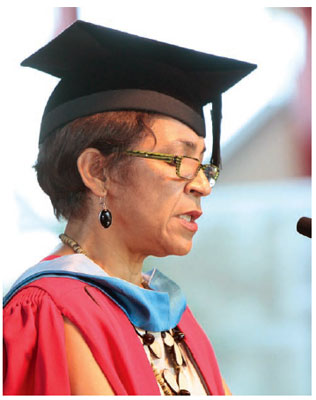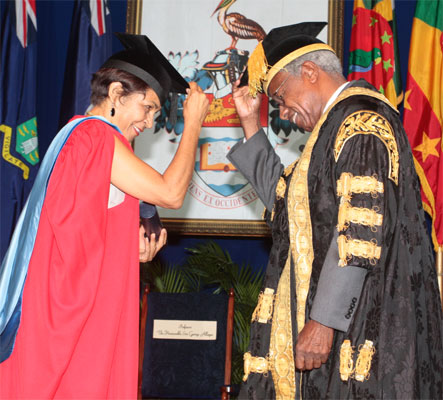|
December 2013

Issue Home >>
|

 It is an honour to be able to address you on this auspicious day. It is an emotional experience to see so many people graduating after several years of focused studying of the work that has gone before in your various fields and also of learning how you can add to that store of human knowledge and advance the human condition. The younger ones among you have also been learning how to be thoughtful, enterprising, citizens. After such a big and sustained investment much is expected of you. It is an honour to be able to address you on this auspicious day. It is an emotional experience to see so many people graduating after several years of focused studying of the work that has gone before in your various fields and also of learning how you can add to that store of human knowledge and advance the human condition. The younger ones among you have also been learning how to be thoughtful, enterprising, citizens. After such a big and sustained investment much is expected of you.
It is not particularly easy, however, to negotiate the transition into the complex world of work and independent life in society. University provides a very welcome staging post to ease us into that phase of our lives called adulthood. If we are lucky, we spend a very long time as adults. Some of you could have another 60-70 years, but it won’t necessarily always be easy. As I was living them I knew my university years were the most privileged of all. I would pinch myself and reflect upon the fact that a lot of people, through public funds, were supporting me in the quest to be the best that I could be and to have a chance in life, not just for myself, but for them and for others, to perhaps make a difference and to exit, eventually, with a sense of having exploited opportunities and realized my potential. I would like to thank my mother, who is here today, for teaching me that privilege is a benefit not enjoyed by all and that it brings responsibility. It has influenced how I have lived and worked.
You, graduates, are just closing a very important period in your lives. And you have worked hard to be here. Many people do not get this far, for very varied reasons. So everyone in this room is proud of each one of you and congratulates you. I do not think, however, that having been to university necessarily makes you a good person, and while, in such a rich country as ours, higher education should be available to all, there should be no notion of entitlement or of being superior. In fact, one must always guard against the sense that things should happen for you, or that something is your right or that life’s lucky breaks make you a cut above the rest. You should know that after hubris comes the fall.
As children we learn that not all is fair, not all is just, and as we go out into the world of work and still more complex relationships we soon realize that much is also dishonest, elusive and illusive. We meet misanthropic people, those who seem hell-bent on creating disorder, those who are wilfully corrosive. It requires us to find a centre in ourselves, to draw upon the knowledge we have gained. Fortunately, we have aids in that process. Religious belief plays a key role in many people’s lives, in helping them find and maintain their strength. The arts also offer much in helping us make sense of the world and of human behaviour and to see beyond the immediate.
Maya Angelou, the celebrated African-American writer who had a Trinidadian grandfather, not that that had anything directly to do with the fact that her childhood was exceptionally difficult; reflected: “when I look back, I am so impressed again with the life-giving power of literature. If I were a young person today, trying to gain a sense of myself in the world, I would do that again by reading, just as I did when I was young.”
You see here before you a great believer in the power of cultural forms of expressions, of our arts—literary, musical, visual, aural—to shape, to transform, to heal. We know because there are many testimonies to how much playing the steelpan, for example, has contributed to the lives of myriad young people, giving them a sense of achievement, and developing skills, discipline, memory, imagination.
I can personally testify to the transforming nature of artistic expression through my work in Britain as a trustee of the Koestler Trust, a charity set up by the influential writer, Arthur Koestler, to feed the minds and spirits of people in prison and stave off the apathy, depression and gradual dehumanization that he himself experienced as a prisoner during WWII. Koestler came to know the power of the arts while locked up in France, Spain and England, for being a suspected spy, a subversive and undesirable alien.
I saw how being able to express themselves creatively changed the behaviour of many imprisoned people. One man, serving a long sentence for manslaughter, forgotten in a bleak, far away high security English prison became a successful celebrated painter after he found his humanity, his voice and his freedom through painting. Today, he is a reformed and contributing member of society. When I look at his extraordinary, searching painting on my wall I reflect upon its huge significance.
 As you have heard, I am the founder of this country’s annual literary festival, the NGC Bocas Lit Fest. I and other like-minded people—supported by key sponsors such as the National Gas Company of Trinidad and Tobago and the government through ministries such as the Ministry of Planning and Sustainable Development—produce a free literary event that attracts people from all over this country, the region and internationally. We started that enterprise in the common knowledge that Trinbagonians do not read, that literacy rates are falling just when new communications technology requires us to be more literate and smarter still, and that apart from one or two successful writers living here in the region no new writers were in the wings. As you have heard, I am the founder of this country’s annual literary festival, the NGC Bocas Lit Fest. I and other like-minded people—supported by key sponsors such as the National Gas Company of Trinidad and Tobago and the government through ministries such as the Ministry of Planning and Sustainable Development—produce a free literary event that attracts people from all over this country, the region and internationally. We started that enterprise in the common knowledge that Trinbagonians do not read, that literacy rates are falling just when new communications technology requires us to be more literate and smarter still, and that apart from one or two successful writers living here in the region no new writers were in the wings.
All of those turned out to be half-truths. Just as well that we believed in the possibility of change and we dared to try to effect it, to go against received opinion, to think outside of the box and imagine a different reality. The festival has struck a note nationally and internationally. It has helped to remind people of our long literary heritage. CLR James, Sam Selvon, Sir Vidia Naipaul, Derek Walcott, Earl Lovelace and others are stars in the literary firmament and a new generation of writers is emerging, calling upon us to acknowledge the intellectual and creative wealth we have and to put it to use in expressing our national consciousness as we do in other art forms.
We recognize that we have a wealth of talent and we have begun to value the arts and humanities more for what they can, and do, contribute to society because we know that a nation’s culture is an expression of what and who we are and that we cannot just ignore it because it influences us all. But as a country and a people do we fully appreciate the pivotal role the arts play in our national development? There is a lot of work still to do to develop our cultural talent to its maximum. We can help that process along by teaching and training arts administrators to run arts organizations properly, people who can help shape the arts as professions, with career paths that lead to proper living standards for its exponents. Most people in the arts have to eke out a living but the arts are big business, worth many billions of dollars. We at the Bocas Lit Fest are concentrating on how to push forward in the literary field, nationally and regionally, by adding missing elements to the existing eco-system.
We need to exploit the fact that the arts have wide application. You should know that a 2008 report revealed that of the 652 US-born Silicon Valley CEOs, only 37% had degrees in computer technology or engineering and only 2% had them in mathematics. The remaining CEOs had arts degrees. The arts are a vehicle for understanding humanity and increasingly business is calling upon arts graduates to give them an advantage in a highly competitive market place. The arts have value beyond the obvious.
With these thoughts in mind, I stand before you to accept this Honorary Doctorate which this important University that has played such a critical part in developing the potential and talent of tens of thousands of Caribbean men and women has so kindly bestowed upon me. I had always regretted not being part of this academic institution but from today I am inextricably bound to it. I feel most privileged.
All of you, too, are now privileged. Through your hard work and determination, you are graduates of The University of the West Indies and now you have a great responsibility to use this privilege to the advantage of others. Remember every time you have an emotional response to a story, a book, a film, a poem, a painting, a piece of music you should use that emotional intelligence gained, that insight into the people around you, to help shape and improve society. So, go out and develop a new generation of leaders, create new homegrown institutions that will endure, start a new art movement, invent a new musical form, write a novel, save a life, or help give voice to those who can’t find theirs.
I wish you well and thank you for your attention.
This is the address given to graduates of the Faculty of Humanities and Education, UWI, St Augustine, on October 26, 2013.

|





